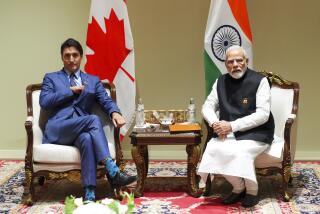Analysts surprised by alleged Al Qaeda in Iran tie in Canada plot
Police in Canada said Monday that two men suspected of plotting to derail a passenger train were guided by Al Qaeda elements in Iran, but the statement surprised many experts who study terrorism in the Middle East and Iran.
“It frankly doesn’t compute for me,” said Barbara Slavin, a senior fellow at the Atlantic Council. “If there is any link, I would think it was extremely tangential.”
Iran and Al Qaeda have frequently had chilly relations, according to Slavin and other experts. Iran is majority Shiite, while Al Qaeda is firmly Sunni. In Syria, Al Qaeda has jumped into the fray alongside opposition fighters while Iran has backed President Bashar Assad. Iran has also held Al Qaeda members in the country under house arrest, monitoring their activities. Documents confiscated from Osama bin Laden’s hide-out in Pakistan and released last year suggested discord between the two.
Canadian police said there was no reason to believe that the plotted attacks were sponsored by any state, which would mean the Iranian government was not involved. Police provided no further details regarding the alleged involvement of Al Qaeda elements in Iran in the plot.
Even if Iran and Al Qaeda share some of the same enemies, “it’s not like Iranians are going to allow a Sunni terrorist group to plan an attack that might result in more hostilities against the Shiite nation of Iran,” said Rick “Ozzie” Nelson, a former U.S. counter-terrorism official and a senior affiliate at the Center for Strategic and International Studies. “There’s no love lost between them.”
If Al Qaeda members detained in Iran were able to continue orchestrating attacks, that could mean members of the terrorist group have more freedom there than previously believed, Nelson said. That might mean they were able to plot an attack without being detected by Iranian authorities.
The question could be, “How much of this was them just not paying attention?” Nelson said.
Not everyone has been skeptical of the idea that Iran and Al Qaeda could team up, however. “Iran appears willing to expand its limited relationship with Al Qaeda,” Rand Corp. senior political scientist Seth G. Jones wrote in Foreign Affairs magazine last year. Al Qaeda would probably reject any direction from Iran, he wrote, but “any support or tentative permission to plot on Iran’s soil would be helpful.”
The U.S. Treasury Department said in October that Iran has allowed Al Qaeda to operate a pipeline moving money and fighters to support Al Qaeda activities in South Asia. While Sunni extremists often consider Shiites to be “heretics,” some Shiite extremists have tried to forge alliances, said Jeffrey M. Bale, a senior researcher at the Monterey Institute of International Studies. Al Qaeda members are believed to have gotten training from Iranian-backed Hezbollah in Lebanon in the past.
“It’s extremely complicated and murky,” Bale said. Iran itself is not a monolith, he added, and different parts of its military and clerical establishment might weigh working with Al Qaeda differently.
ALSO:
Canada arrests 2 in alleged Al Qaeda-backed terror plot
Israeli airline workers end strike over ‘open skies’ agreement
Myanmar forces accused of ‘ethnic cleansing’ as EU ends sanctions
More to Read
Sign up for Essential California
The most important California stories and recommendations in your inbox every morning.
You may occasionally receive promotional content from the Los Angeles Times.










